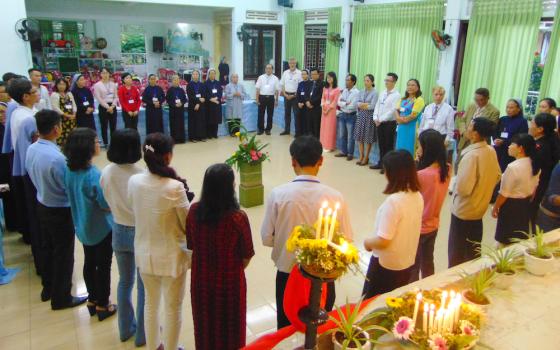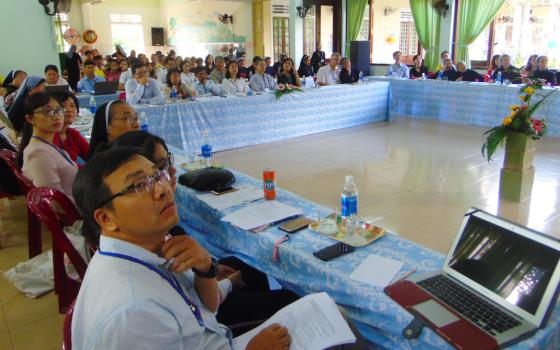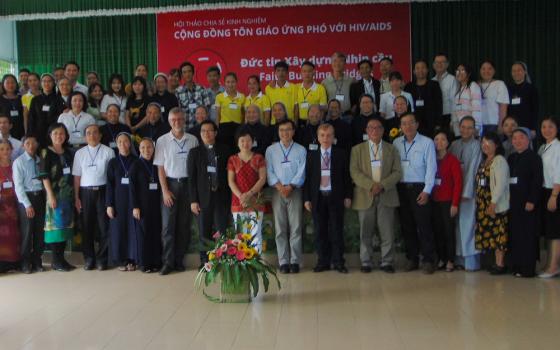Nuns and members of religious groups and government agencies who serve people with HIV/AIDS gathered at a recent symposium focused on how to end the disease, share best practices and experiences caring for patients and explore how to work together better.
More than 80 representatives from women congregations, and Christian and Buddhist groups based in Hanoi, Hue and Ho Chi Minh City attended the symposium themed "Faith Builds Bridges" held on Dec. 2 by Filles de Marie Immaculee (Daughters of Mary of the Immaculate Conception) at the congregation's mother house.
The national symposium sponsored by Misereor, the German Catholic bishops' international development organization, also drew representatives from international and domestic non-governmental organizations, Caritas Vietnam, health care centers run by religious groups, HIV/AIDS workers and government agencies.
Sr. Maria Pham Thi Bich Thuy, superior of the congregation, said the symposium aimed to mobilize religious communities and organizations to end the HIV/AIDS epidemic, gain their strong commitment to caring for people with HIV/AIDS, and build bridges among religious groups and other organizations to work with HIV patients.
Thuy said the event also aimed at creating opportunities for religious groups to share their own real experiences in caring for people with HIV/AIDS.
She said her congregation started to provide material and emotional support to people who live with HIV in Thua Thien Hue province 20 years ago. "At first we worried about our new ministry and feared the disease's outbreak, but we tried to overcome challenges by cooperating with Buddhist nuns, Protestant pastors, nuns from other orders and volunteers to give love and care to patients," she said.
"Today we are confident of our services and gain valuable experiences in dealing with patients suffering HIV/AIDS," the nuns said. "We are well aware that our work brings joy and happiness to patients — that is our wish and aspiration."
Thich Nu Lien Huong, a Buddhist nun who heads a group of HIV/AIDS volunteers, said that since 1996, Christian and Buddhist volunteers in Hue City have worked together to serve people with HIV/AIDS.
She said they offer patients food, vocational skills training, money to start small businesses, and scholarships to their children. Patients are also given professional advice.
"When our friends [HIV/AIDS patients] die, we all pay a minute of silence to them and pray for them to rest in peace regardless of what their faiths are," Lien Huong said. Volunteers help conduct funerals and donate coffins.
Dr. Klemens Ochel, who manages HIV/AIDS projects sponsored by Misereor in Vietnam, appreciated local religious groups' efforts to build bridges of love, sympathy, solidarity, cooperation and respect between patients and ordinary people. They also provide proper health care and medicine for patients to control their diseases and improve their quality of life.
Klemens said people with HIV/AIDS still suffer discriminatory practices in their communities, schools and health care centers.
"It is important to educate people to understand HIV/AIDS so that they can treat patients fairly," he said. "We should not keep ourselves aloof from patients and treat them like sinners because we all are sinners."
Some patients told participants about discrimination against them.
A woman was in tears as she described how her daughter, who studied at a public school, was avoided by her classmates and was not given meals at the school. In 2014, she and her daughter moved to Hanoi and were given support from nuns. "Since then we have not returned home," the woman from Ha Nam province said.
Another woman from Hai Phong City said some public health centers do not offer enough medicine to patients. Or they don't release their personal information, which means prevents people from buying health insurance.
Dr. Cao Thi Kim Thoa from the HIV/AIDS Prevention Administration said the country records 208,750 people living with HIV/AIDS and estimates there are about 50,000 others who are not documented.
Thoa admitted that the Health Ministry lacks funds for supplying free antiretroviral drugs to patients, so people living with HIV/AIDS will have to use medical insurance to buy their own medication early next year.
Dr. Joseph Nguyen Dang Phan, from a Catholic clinic based in Ho Chi Minh City, said that the staff there offer medical and spiritual treatment and advice to patients who have been disowned by their families or community, including migrant workers, same-sex couples, transgender people, and those who have syphilis and tuberculosis. Those people often have lost their will to live and are afraid to seek medical treatment at public hospitals.
Phan said his group has a chapel for patients to pray during their treatment.
He said the clinic treated 2,400 patients in 2017. Twenty-six percent are Catholics.
Fr. John Baptist Phuong Dinh Toai, who runs a center for 300 children who were abandoned by their parents who have HIV/AIDS, urged participants to "work together to wipe out discrimination against HIV/AIDS patients, record no new cases and no one dying of HIV/AIDS in the country."
During the symposium, participants watched dances and a yoga performance given by nuns and people with HIV/AIDS. They also attended a prayer session to pray for people with HIV/AIDS to live with dignity.
Pastor Phan Long from a Protestant community in Hue City said his church wanted to work with other groups to give loving care to patients "because they are also children of God."
Long said Christian organizations abroad funded HIV/AIDS projects in Vietnam.
"We believe that God uses patients to build bridges of love among us," he said.
[Joachim Pham is a correspondent for National Catholic Reporter and Global Sisters Report, based in Vietnam.]


